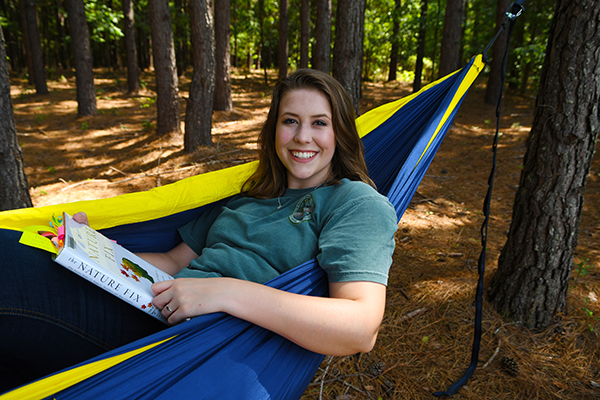Summer Fellow, Ashlee Anderson hopes to improve psychotherapy with wilderness therapy

Ashlee Anderson, a senior psychology major from Chapin, S.C., is studying wilderness therapy as a part of her Summer Fellow research. Her research looks to see how wilderness therapy works and is different from traditional indoor therapy.
“I hope to find ways that we can better improve psychotherapy and make it more available to people since wilderness is completely free,” Anderson said. “I hope to one day incorporate wilderness therapy when I am a counselor myself.”
“Ashlee’s work on wilderness therapy is as timely as it is important,” said Dr. Bob Bryant, the Kristen Herrington Professor of Bible at Presbyterian College and Anderson’s project advisor. “The outdoors, especially wild places, can help us become healthier and more humane. On one hand, our American identity and culture have deep roots in wilderness encounters which helped shape common values, such as self-respect, self-reliance, and a cooperative spirit that’s respectful of others. On the other hand, wilderness is vanishing at an astonishing rate and Americans are spending less and less time outdoors, and this is to our detriment individually and collectively.”
According to Anderson, wilderness therapy uses physical activity and mentally engaging tasks in wilderness environments to improve the mental well-being and behavior of participants. The therapy is typically done with adolescents and at-risk youth.
“The nation that gave the world national parks and forests is losing appreciation of its birthright and its national character is changing accordingly,” Bryant added. “Furthermore, stress-related and other disorders are everywhere apparent and growing, but wilderness can be a highly effective catalyst for wholeness.”
“Wilderness therapy works so well due to many reasons,” Anderson said. “Trees release natural compounds to keep pests off them and these compounds have a positive biological effect on our health. There have been studies that show 40 minute walks in nature decrease blood pressure, decrease stress hormones, and lower heart rates.”
Anderson’s research has come from multiple sources including book and interviews with professionals working in and with wilderness programs. She is surveying the field of literature and research to chronicle the wide-ranging benefits of wilderness, such as for personal fitness, biological health, psychological well-being, emotional maturity, relational intelligence and environmental stewardship. She is then cataloging the breadth and depth of therapeutic approaches that utilize wilderness to facilitate human wholeness and relational well-being. Anderson is then developing a rubric of her own wilderness counseling that she will continue to explore in the coming academic year with members of the psychology department.
“What provoked and caused an incredible change in the individuals who participate in wilderness therapy, were the relationships they formed with their peers, their guides, and their counselors,” Anderson said. “Connecting with nature allows a pathway to open up important connections to friends and family.”
Anderson is a member of the PC choir and tutors during the school year.
The PC Summer Fellows Program is designed to enhance the academic experience of PC students by providing them with opportunities to work with faculty during the summer. The program is intended for motivated students to gain research experience with direct faculty mentoring. Students experience the process of research as a creative intellectual activity in a living-learning environment.
Presbyterian College is located on a striking 240-acre campus in Clinton, between Columbia and Greenville, S.C. Offering challenging academics and a culture of honor, ethics, and service that prepares students to be leaders in communities, PC offers its students the benefit of engaging with an exceptional faculty who take individual interest in their students’ well-being, both personally and in the classroom. The Presbyterian College School of Pharmacy is dedicated to the ideals of leadership, honor to the profession, and service to the community. For more information about Presbyterian College, visit www.presby.edu.
